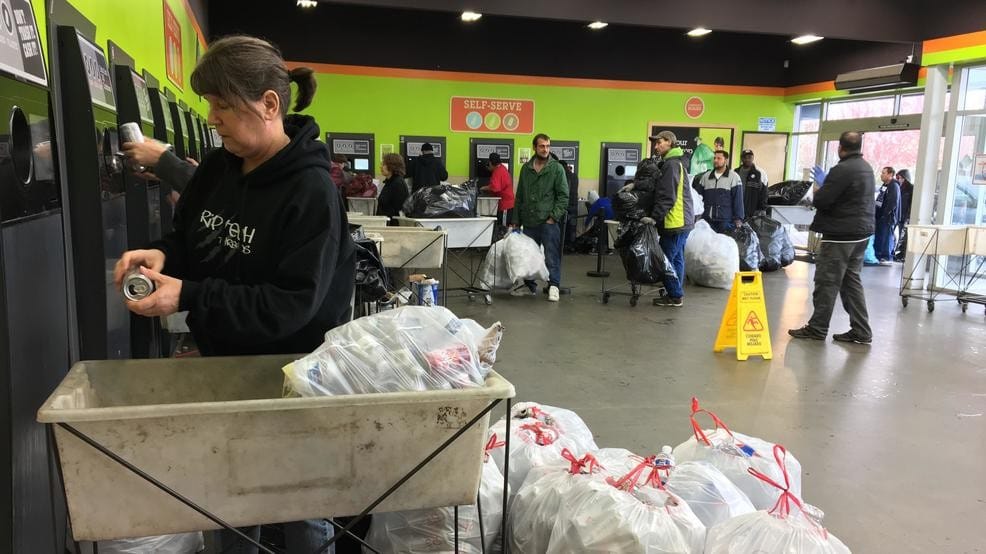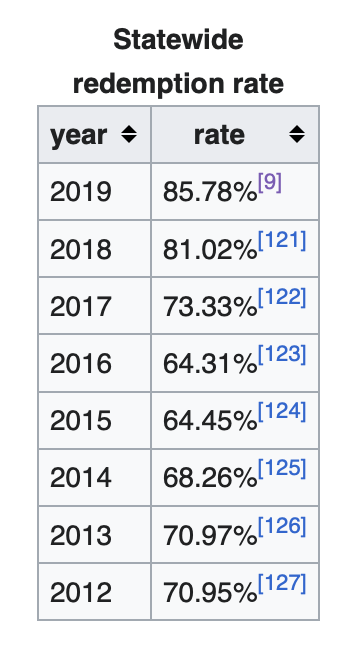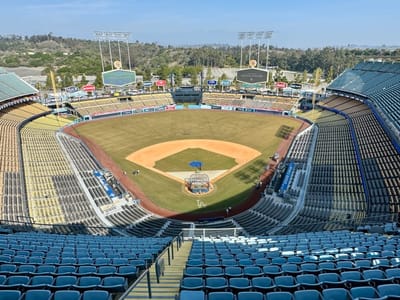Oregon's bottle law

A few years ago, Oregon upped their redemption price for beverage containers from 5¢ to 10¢, and I remembered doing a double-take because it seemed like a pretty big possible shift.
I didn't know it at the time, but Oregon was the first place in the USA to institute a redemption program for bottles and cans. Back in the early 1970s when it was launched, litter along highways and beaches and in forests was pretty prevalent. I remember freeways being riddled with garbage as a young kid, and seeing people throw bags of McDonald's trash out their windows while driving whenever they finished eating (it was a different time I guess). Adding a small return value to every container meant most people brought them back, and it worked. By the end of the 1970s, Oregon reduced litter by over 80%.
Good incentives lead to good outcomes, right?
The rule change happened in 2017, and my first thought was wow, doubling the rate could really change the economics of the whole program, I wonder how redemption rates will change and how much someone could really make off it?
How it works
An unexpected part of the program is that the money behind it comes from every customer. You pay an extra 10¢ at the register any time you buy something in a bottle or can, along with surprise $1.20 charges on every 12-pack. I remember hearing stories of federal regulations brewing in the 1970s to combat litter and how initially they were targeting big brands like Coke and Pepsi and Coors and Budweiser, but those companies got together and made sure the funding didn't come from them, but instead from their own customers.
When the law changed to a dime per can/bottle here, I checked newspapers at the time to see what kind of limits there were and that's when I was a bit surprised by it. When the redemption values doubled, they reduced the maximum number of containers you could return in a day by half. Pretty nuts, right? For most folks, the limit per day is around $14 maximum, as it was before. That's not much to live on, so why decrease the limits when increasing the payout?
Rules. And more rules. And even more rules.
I recently checked the Oregon Bottle Law FAQ on the state's own site. The FAQ starts simple, but quickly grows complex. In total, it's 12 pages of rules when I thought they'd fit on 1 or 2.
Most beverages that aren't hard liquor or wine get a redemption value that customers pay at the register. Every can or bottle MUST have printing on it that says it has Oregon redemption value, except for kombucha, hard seltzer, or energy drinks (why specifically just those for the labeling rule?).
Daily limits on redemption have lots more rules. Is the store you are returning cans at in zone 1 or zone 2? Is the square footage of the store over, or under 5,000 square feet? (sidetone: does anyone know what a 5,000sqft store is supposed to look like? I'm a good estimator and I can't picture one myself)
Did you use the special green bags? Oh, you didn't know about the 35¢ special green bags, well those let you return larger amounts all at once, but you have to sign up for an online account where you have a running balance instead of daily cashouts that some grocery stores (depends on more rules) can give you store credit that increases your redemption value by 20%, but you have to pay for those special green bags, against your ongoing account.
Larger stores have to run bottle/can redemption machines during most store hours, but since they're slow and break down often, you get lines so instead of stores making it easier to use them out front, they tend to put them further back in their store, away from shopper's eyes, ensuring the task of dragging bags of old cans is a longer walk of shame through the entire store.
Aside from grocery stores, there are dedicated bottle redemption centers, but there are only in major cities, about 30-50 miles apart where neighbors frequently complain about long lines of people "up to no good" in their area.
Means testing sucks
Return your can or bottle and get some cash back seems so simple. I used to do it myself as a kid with glass bottles, at the same store where I would buy an occasional soda. When I was really little, my brother and I would gather up enough glass bottles in our house to pay for a new bottle of coke, keeping the cycle going.
I like simple concepts and simple solutions. And I understand there are hundreds of weird edge cases that might push a regulatory body to add more conditions and caveats and carve-outs, but the whole things feels like when a simple charity program gains a bunch of means testing. You'll get $300 a week if you're out of work—but you have to prove you're looking for work and not enjoying your time off. Or you can only have child support with a maximum number of kids. Or you need to work a minimum number of hours per week to qualify for this scholarship. Or you have to pass a drug test and be clean before we give you any money.
The verdict

Looking at the data, I'm pretty surprised it's over 85% of all containers getting returned in 2019. Personally, I tend to toss my redemption-ready canisters into my weekly recycling, because the programs are so heavy on rules and my local grocery store has a very slow single machine that always has a line. Almost every home in Oregon is part of a recycling program, so if you don't want to wait in lines, it is much easier to toss your cans into the biweekly recycling bins.
While researching the current return rates, I learned the value per can only shot up because redemption rates had fallen so much. When the rate dipped below 70% in 2014, it triggered an automatic rate increase to further incentivize people to return them. But then again, with the limits halved at the same time, the daily maximum was unchanged, so it's more of a perception thing that benefits people casually returning just a few things well below the limits.
A reflection
The program in my state feels like a mirror to similar programs in the the US. You start with a simple concept that can be explained in just a few seconds. Bring cans back, get money back. Need help feeding your family, here's money for groceries. Out of work, here's your unemployment to make ends meet.
But then we start layering on conditions and limits and rules on how and when and who can even participate.
Sometimes, I wish simple things could be more simple.
Subscribe to our newsletter.
Be the first to know - subscribe today





